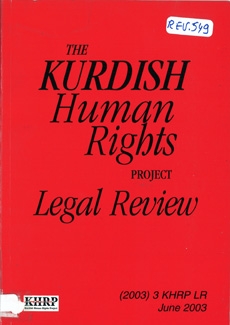|
SECTION 1:
Legal Developments in the Kurdish Regions
Turkish Parliament adopts National Security Council law amendment1
On 17 January 2003, the Turkish Parliament approved a draft law amending the National Security Council (NSC) law, in line with a Constitutional amendment made on 3 October 2001. The Constitutional amendment was part of a package of legislative reforms, made in order to meet European standards of democracy, as set out in the EU Accession Partnership Agreement. That agreement stated, inter alia, that the NSC should align itself with its constitutional role as an advisory body to the government, and that civilian control over the military should be increased1. The 2002 Regular Report by the European Commission, which evaluated Turkey’s progress towards fulfilment of the criteria, noted that though the NSC was formally an advisory body to the government, its opinions carried more weight than mere recommendations and that the military members were particularly influential'.
With the amendment that passed Parliament, the deputy prime minister and justice minister will become NSC members, while the NSC decisions will be counted as “recommendations” only. The President, prime minister, defence, interior and foreign ministers, Chief of Staff, force commanders and NSC secretary are the current members of the council. The amendment’s effectiveness will depend on whether the military will still have de facto control and whether calling decisions “recommendations” will have any practical effect.
Turkey orders therapy for police to combat torture1
As part of efforts to combat torture, the Turkish government has ordered policemen to undergo regular psychological therapy. The Interior Minister Abdulkadir Aksu renewed warnings that the government intended to crack down on security officials accused of torture and ill-treatment in detention centres. In calling for measures to reduce the tension inherent in some of the more sensitive jobs, notably riot units and interrogation centres, he ordered individual and group therapy to be undertaken with psychological counsellors at least once a month. The professed aim was to reduce stress that might come from the officers’ professional environment, family or social and economic situation. The Minister also stated that training programs would be organised to inform police officers about recent legal reforms that grant additional rights to detainees and set out tougher anti-torture measures.
Committee of Ministers adopts a Declaration and a Resolution on the European Court of Human Rights’
At a meeting of the Council of Europe’s Committee of Ministers (“The Committee”) on 6-7 November 2002, a declaration was adopted concerning the increased workload of the European Court of Human Rights. It expressed concern that the increase in the workload for the Court threatened to ultimately put at risk the effectiveness of the unique right of individual application. Having further considered the recommendations made by the Evaluation Group on the Court and of the Steering Committee for Human Rights, the Committee instructed the Foreign Ministers’ Deputies to present a set of coherent proposals covering measures that could be implemented immediately and any possible amendments to the Convention. Priority was placed on preventing violations at the national level and improving domestic remedies; optimising the effectiveness of the filtering and processing of documents; and improving and accelerating the execution of judgments of the Court.
At the 822nd meeting of the Committee of Ministers’ Deputies, a resolution was adopted which noted the increased practice of resorting to “friendly settlements” in order to resolve “repetitive cases or cases that do not raise any question of principle or of changes of the domestic legal situation”. It considered that this was a viable method for alleviating the workload of the Court, and stressed the importance of giving further consideration in all cases to the possibilities of concluding friendly settlements.
Such friendly settlements would indeed be a method of decreasing the workload of the Court, but the resolution’s inclusion of cases that do not raise any question of principle reveals the move of the Court towards a constitutional court, i.e. only ruling on cases that raise “substantial or new and complex issues of human rights law”6. A worrying consequence for applicants would be the possibility that the Court could strike out their complaints if a settlement offer was not accepted, even if the applicant did not consider the offer at all a remedy for his or her complaints.7
Progress report on the Joint NGO Response to proposals for reform of the European Convention of Human Rights
The European Convention on Human Rights8 [the Convention] occupies a position of unique importance in the international protection of the rights of individuals, entitling both nationals and non-nationals from all of the 44 member states of the Council of Europe to petition directly the European Court of Human Rights [the Court] for a binding determination on the proper application of their human rights and fundamental freedoms. On T1 September 2001, the Evaluation Group to the Committee of Ministers on the European Court of Human Rights published a number of proposals pursuant to the goal of reducing the spiralling costs and …
| 